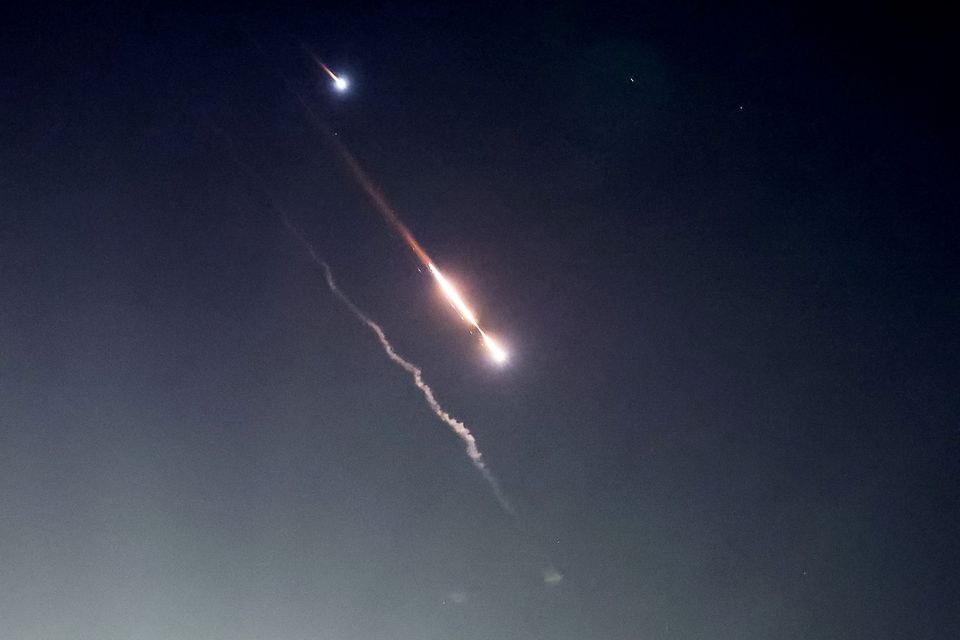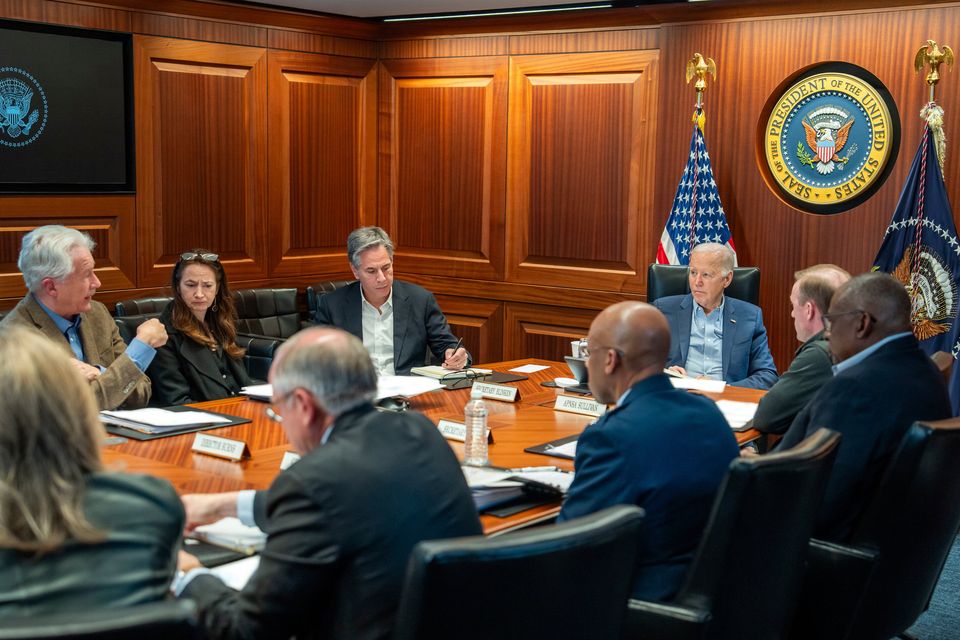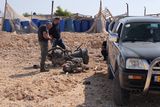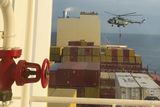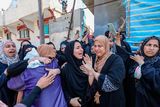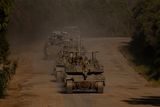Biden convenes G7 to discuss Iranian threat and prevent an escalation after the attack on Israel
Biden to convene a meeting of the Group of 7 nations today "to coordinate a united diplomatic response to Iran's brazen attack"Netanyahu vowed his country would achieve victory, posting on X: "We intercepted. We blocked. Together, we will win."The UN Security Council set to meet at 8pm (GMT) after Israel requested it condemn Iran's attackTaoiseach Simon Harris condemns “reckless” attack, warning against any escalationTrump says Iran attack “would never have happened if I were president”Global powers Russia, China and France, as well as Arab states Egypt, Qatar and the UAE urge restraint
Israel's Netanyahu vows victory after Iran strikes, fears of wider conflict grow
President Joe Biden convened the Group of Seven advanced democracies on Sunday to coordinate a rebuke to Iran for its unprecedented and largely unsuccessful aerial attack on Israel and to prevent a wider regional escalation.
The United States assisted Israel in shooting down dozens of drones and missiles fired by Tehran in what was the first time that Iran has launched a direct military assault on Israel. Israeli authorities said 99pc of the inbound weapons were shot down without causing any significant damage.
“At my direction, to support the defense of Israel, the U.S. military moved aircraft and ballistic missile defense destroyers to the region over the course of the past week,” Biden said in a statement late Saturday.
“Thanks to these deployments and the extraordinary skill of our service members, we helped Israel take down nearly all of the incoming drones and missiles.”
Biden, in a call with Israeli Prime Minister Benjamin Netanyahu that night, urged that Israel claim victory for its defense prowess as the president aimed to dissuade America's closest Mideast ally from a larger retaliatory strike against Iran. Biden, according to a senior administration official, told Netanyahu that the U.S. would not participate in any offensive action against Iran. The official was not authorized to publicly discuss the private conversation and spoke on condition of anonymity.
“I told him that Israel demonstrated a remarkable capacity to defend against and defeat even unprecedented attacks -– sending a clear message to its foes that they cannot effectively threaten the security of Israel,” Biden said in his statement.
The G7 meeting, Biden said, is intended “to coordinate a united diplomatic response to Iran’s brazen attack.”
The effort to encourage Israel to show restraint mirrored ongoing American efforts to curtail Israel's war against Hamas in Gaza, which is now in its seventh month, and to do more to protect civilian lives in the territory.
Florida Sen. Marco Rubio, the top Republican on the Senate Intelligence Committee, criticized White House for “leaking it to the press” that Biden told Netanyahu to take the win and not retaliate.
Rubio told CNN's “State of the Union” that it wast “part of the White House’s efforts to appease” people calling for a cease-fire in Gaza.
Meanwhile, Iran warned Israel and the United States on Sunday of a much larger response if there is any retaliation for its mass drone and missile attack on Israeli territory overnight, as Israel said "the campaign is not over yet".
The threat of open warfare erupting between the arch Middle East foes and dragging in the United States has put the region on edge as Washington said America did not seek conflict with Iran but would not hesitate to protect its forces and Israel.
Iran launched the attack over a suspected Israeli strike on its consulate in Syria on April 1 that killed top Revolutionary Guards commanders and followed months of clashes between Israel and Iran's regional allies, triggered by the war in Gaza.
However, the attack from hundreds of missiles and drones, mostly launched from inside Iran, caused only modest damage in Israel as most were shot down with the help of the US, Britain and Jordan.
An Air Force base in southern Israel was hit, but continued to operate as normal and a 7-year old child was seriously hurt by shrapnel. There were no other reports of serious damage.
Objects are seen in the sky above Jerusalem after Iran launched drones and missiles towards Israel (REUTERS/Ronen Zvulun)
Ahead of a war cabinet meeting in Israel, cabinet minister Benny Gantz warned Israel will retaliate when the time is right.
"We will build a regional coalition and exact the price from Iran in the fashion and timing that is right for us," Gantz said in a statement.
White House spokesman John Kirby said on NBC's Meet the Press that repelling the mass drone attack had been a "incredible military achievement" by Israel and its partners and had shown how Israel is not isolated on the world stage.
"Now, whether and how the Israelis will respond, that's going to be up to them. We understand that and respect that. But the president's been very clear: we don't seek a war with Iran."
The Islamic Republic's mission to the United Nations said its actions were aimed at punishing "Israeli crimes", but that it now "deemed the matter concluded".
Iranian army chief of staff Major General Mohammad Bagheri warned on television that "our response will be much larger than tonight's military action if Israel retaliates against Iran" and told Washington its bases could also be attacked if it helped Israel retaliate.
Iranian Foreign Minister Amir Abdollahian said Tehran had informed the United States its attack on Israel would be "limited" and for self defence and that regional neighbours had also been informed of its planned strikes 72-hours in advance.
Global powers Russia, China, France and Germany as well as Arab states Egypt, Qatar and the United Arab Emirates urged restraint.
"We will do everything to stop a further escalation," German Chancellor Olaf Scholz said on a visit to China. "We can only warn everyone, especially Iran, against continuing this way."
Turkey also warned Iran it did not want further tension in the region.
The U.N. Security Council was set to meet at 4 p.m. ET (2000 GMT) on Sunday.
Joe Biden meets with members of the National Security team regarding the unfolding missile attacks on Israel from Iran, Saturday, April 13, 2024, in the White House Situation Room in Washington. (Adam Schultz/The White House via AP)
Analysts debated how far Iran's attack was calibrated to cause genuine devastation in Israel, or to save face at home after vows of revenge while avoiding a major new war.
"I think the Iranians took into consideration the fact that Israel has a very, very strong multi-layer anti-missile system and they probably took into consideration that there will not be too many casualties," said Sima Shine, a former senior Mossad official at the Institute for National Security Studies in Tel Aviv.
But if Iran was hoping for a muted response, like with its missile attacks on U.S. forces in Iraq after the killing of Guards commander Qassem Soleimani in 2020, she warned "I don't think Israel sees it this way".
On Saturday Iran's Revolutionary Guards seized an Israel-linked cargo ship in the Strait of Hormuz, one of the world's most important energy shipping routes, underscoring the risks to the world economy of a wider conflict.
Some flights were suspended in countries across the region and share prices fell in stock markets in Israel and Gulf states.
The war in Gaza, which Israel invaded after an attack by Iran-backed Hamas on Oct. 7, has spread to fronts with Iran-aligned groups in Lebanon, Syria, Yemen and Iraq.
Iran's most powerful ally in the region, the Lebanese Shi'ite group Hezbollah fired rockets at an Israeli base overnight. Israel said it struck a Hezbollah site deep inside Lebanon on Sunday morning.
Yemen's Houthis, who have been firing missiles at ships in the Red Sea in what they say is support for the Palestinians, called Iran's attack legitimate.
The Oct. 7 attack in which 1,200 Israelis were killed and 253 taken hostage, along with internal discontent with the government and international pressure over the war in Gaza, form the backdrop to Netanyahu's decisions over a response.
The Israeli prime minister has for years advocated a tough military line against Iran, pushing the United States for harder action over Tehran's nuclear programme and its backing for Hezbollah, Hamas and other groups in the region.
In Israel, although there was alarm at the first direct attack from another country in more than three decades, the mood was in contrast to the trauma after the Hamas-led attack on Oct.7.
"I think we've been given license to respond now. I mean it was a major attack from Iran... I imagine Israel will respond and may be over quickly and get back to normal life," said Jeremy Smith, 60.
In Iran, state television showed small gatherings in several cities celebrating the attack, but in private some Iranians were worried about Israel's response.
"Iran gave Netanyahu a golden opportunity to attack our country. But we, the people of Iran, will bear the brunt of this conflict," said Shima, a 29-year-old nurse, from Tehran.
Join the Irish Independent WhatsApp channel
Stay up to date with all the latest news
